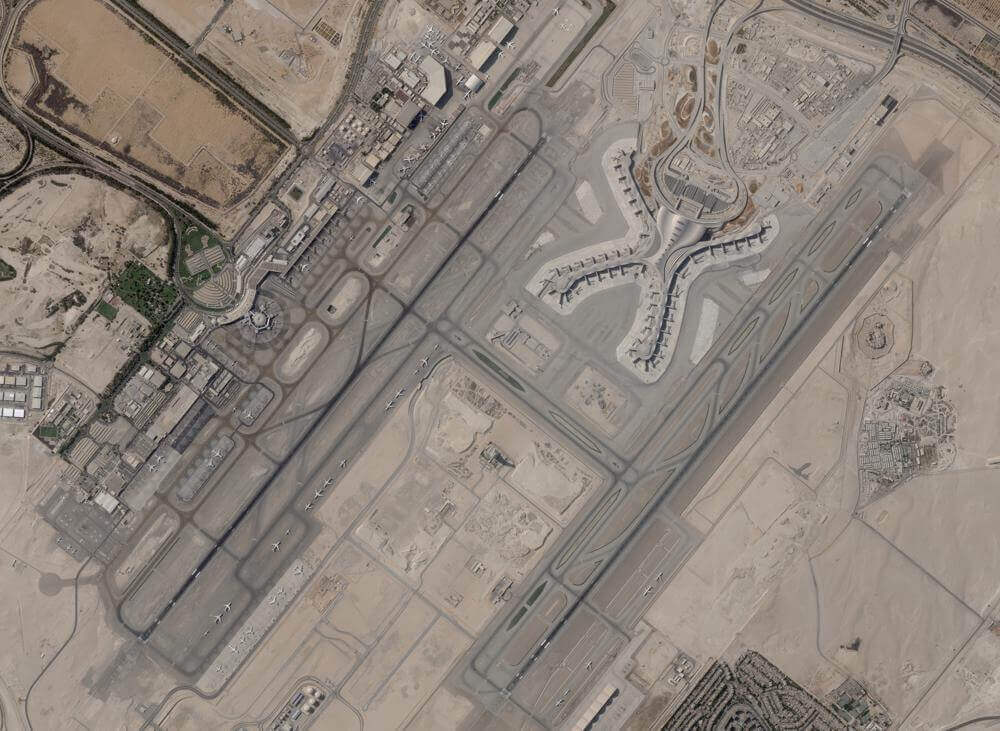Three people, including two Indians, were killed in a Houthi drone attack on the Musaffah industrial area near Abu Dhabi’s international airport on Monday. The attack also led to a fire in the airport.
The attack marks a major shift in the ongoing war between the Saudi-led coalition and the Iran-backed Houthi rebels in Yemen, as the capital of a regional economic and commercial hub was targeted.
Abu Dhabi police reported that the Houthis launched a volley of missiles and armed drones to strike the industrial area and hit a fuel truck, which resulted in a massive explosion that led to the deaths of two Indians and one Pakistani working for the Abu Dhabi National Oil Company (ADNOC).
Six people were wounded in the attack with injuries “ranging from light to medium.” The police said that a full investigation into the attacks and the fires has been launched.
Yahya Saree, the military spokesperson of the Houthis, confirmed the group’s role after saying that they “carried out […] a successful military operation” against “important and sensitive Emirati sites and installations” using ballistic missiles and drones. Saree said that the UAE will continue to be an “unsafe state as long as its aggressive escalation against Yemen continues.”
— Yahya Sare'e (@Yahya_Saree) January 17, 2022
He also warned foreign companies and civilians in the UAE to stay away from important sites. The Houthis “will not hesitate” to attack “more important sites and facilities during the coming period.”
UAE Foreign Minister Sheikh Abdullah bin Zayed Al Nahyan condemned the attacks and said that they “will not go unpunished.” The UAE’s Foreign Ministry released a statement saying that “the UAE reserves the right to respond to those terrorist attacks and sinister criminal escalation.”
“This terrorist militia continues its crimes unchecked in an effort to spread terrorism and chaos in the region to achieve its illegal aims and objectives,” it added. Moreover, UAE officials are looking into whether Iran had any role to play in the attack. “The Houthis do not launch any attack on other countries with drones, [ballistic] missiles or cruise missiles without either the permission of Iran or the instruction from Iran,” an official told the Wall Street Journal.
Tehran is yet to make a statement regarding the attacks. Iran has been accused of backing the Houthis with arms and money, and using the group as a proxy in order to expand its footprint in the Middle East. Iran, however, has denied supporting the rebels.
Anwar Gargash, the diplomatic advisor to UAE President Khalifa bin Zayed Al Nahyan, warned the Houthis against conducting such attacks and stressed that the country will not allow the rebels to destabilise the country’s security and stability. He said that the fate for the Houthis’ “recklessness and absurdity is decline and defeat.”
Moreover, Turki Al Maliki, the spokesperson of the Saudi-led coalition, called the attack a “war crime” and said that the Houthis should be held accountable. “Such crimes sound the alarm of the threat and danger this terrorist militia represents to regional and international security,” he noted, adding that the coalition “will undertake all necessary measures to deter these hostile acts of the Houthi militia against civilians, civilian objects and economic installations.”
On Tuesday, Saudi Crown Prince Mohammed bin Salman (MBS) called Abu Dhabi Crown Prince Mohammed bin Zayed and condemned the attacks. MBS also discussed the security situation in the UAE and offered assistance to aid in the recovery.
In an official statement released by Saudi Arabia, MBS called the incident a “terrorist attack” and said that it “will increase the two countries’ determination to confront” the Houthis. Both leaders urged the international community to condemn “these flagrant violations of international laws and norms as well as to reject and condemn these terrorist crimes that threaten regional and international peace and security.”
The attack was also condemned by the UAE’s regional allies including Qatar, Oman, Kuwait, Bahrain, Jordan and Morocco as well as regional organisations like the Gulf Cooperation Council (GCC), the Organization of Islamic States (OIC) and the Arab League.
Meanwhile, the United States (US) condemned the “terrorist attack,” with National Security Advisor Jake Sullivan saying that Washington will work with international partners to hold the Houthis accountable. “Our commitment to the security of the UAE is unwavering and we stand beside our Emirati partners against all threats to their territory,” he added.
Spoke today with United Arab Emirates’ Minister of Foreign Affairs @ABZayed about the deadly Houthi attacks today impacting civilians and civilian infrastructure. I expressed my condolences and my solidarity with people of the UAE.
— Secretary Antony Blinken (@SecBlinken) January 17, 2022
Furthermore, US Secretary of State Antony Blinken spoke with his Emirati counterpart Sheikh Abdullah and expressed solidarity with the UAE. State Department spokesperson Ned Price also reiterated the US’ “unwavering commitment” to the UAE’s security.
Recently, both the Houthis and the Saudi-led coalition have engaged in tit-for-tat attacks against each other. While the coalition has launched a series of airstrikes against the rebels in their strongholds in Yemen, especially in Marib, the Houthis have resorted to launching ballistic missiles and armed drones to target Saudi cities and oil facilities.
The rebels escalated the conflict when they seized an Emirati-flagged ship in the Red Sea earlier this month. While the Houthis have claimed that the ship was carrying medical equipment, the Houthis have said that the vessel was transporting military equipment. The rebels have refused to release the vessel, despite a United Nations plea.
The unrest in Yemen began in 2014 when a civil war broke out between the Houthis and the internationally recognised Yemeni government. In 2015, a Saudi-led coalition, which included the UAE, launched a major offensive in Yemen by conducting airstrikes on Houthi-controlled areas. Since then, there has been no end in sight to the war, and international efforts to halt the fighting have largely failed.

